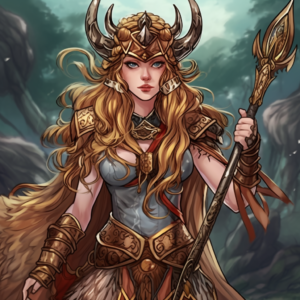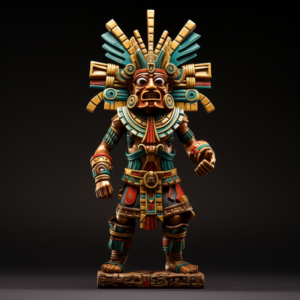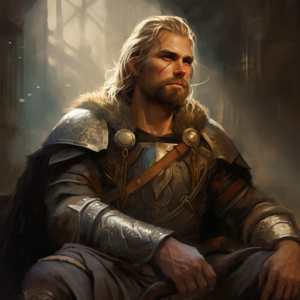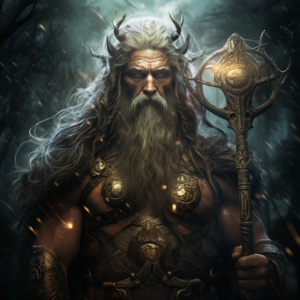Dagda, also known as the Good God, can be traced back to Irish mythology. He is considered one of the most important deities in the Celtic pantheon.
The Dagda is associated with the Tuatha Dé Danann, a mythological race of divine beings in Irish folklore. According to the mythology, the Tuatha Dé Danann were the fourth group of inhabitants to settle in Ireland, arriving from the north. They were believed to possess great supernatural powers and were skilled in magic and craftsmanship.
Origins
In terms of his parentage, the Dagda was said to be the son of the goddess Danu, who was associated with rivers, the earth, and fertility. He was also believed to be the father of many other important figures in Irish mythology, such as Brigid, Aengus, and Bodb Derg.
Appearance
The Dagda is a prominent figure in Celtic mythology, specifically in Irish mythology. He is considered a powerful god associated with abundance, fertility, and wisdom. The Dagda is often depicted as a large and imposing figure with a strong build and a commanding presence.
In terms of appearance, the Dagda is typically portrayed as a middle-aged or older man with a broad, muscular physique. He is described as having a bushy, wild beard and long hair, often flowing and unkempt. The Dagda is often depicted wearing a cloak or mantle, symbolizing his status as a divine figure.
One notable attribute of the Dagda is his magical or divine tool known as the “cauldron of plenty” or “undry,” which is said to be bottomless and capable of providing endless sustenance. This cauldron is often associated with his appearance and is sometimes depicted alongside him.
Family
The Dagda is considered the father or “All-Father” of many of the prominent gods and goddesses in the Celtic pantheon. He is said to have fathered many deities, including Aengus, Brigid, and Cermait, among others. In terms of his parentage, the Dagda was said to be the son of the goddess Danu, who was associated with rivers, the earth, and fertility.
The Dagda is also known to have been in a relationship with the Morrigan, who is a powerful goddess associated with war, fate, and sovereignty. They have several children together, including Brigid.
The Dagda has siblings within the Tuatha Dé Danann. One of his notable siblings is Ogma, who is associated with eloquence, poetry, and language.
The Dagda is said to have had numerous other offspring and relations within the mythology, including children from various unions and encounters. Some stories mention his sons as Bodb Derg, Midir, and Aed, while others mention additional daughters like Áine and Fand.
Symbols
One of the most well-known symbols of the Dagda is his large club or mace known as “Lorg Mór” or “Club of the Great Fury.” This mighty weapon is said to have the power to kill nine men with one end and bring them back to life with the other. It represents his strength and prowess in battle.
The Dagda is closely associated with a magical cauldron known as the “Cauldron of Plenty” or “Cauldron of the Dagda.” This cauldron is said to be bottomless and can provide unlimited nourishment and abundance. It symbolizes his role as a provider of sustenance and represents abundance and prosperity.
The Dagda is also associated with a magical harp called “Uaithne” or “Daur da Bláo.” This harp is said to have the power to control the seasons and emotions, and its music can bring joy or sadness. It represents the Dagda’s connection to music, poetry, and the arts.
The Dagda is often linked to the oak tree, which is considered a sacred tree in Celtic culture. The oak symbolizes strength, longevity, and wisdom. The Dagda is sometimes referred to as “Eochaid Ollathair,” meaning “Horseman, Great Father,” which could be linked to the association of the oak with strength and paternal roles.
Powers & Duties
As the mighty father god, Dagda possesses extraordinary powers and abilities that make him a formidable deity.
God of abundance and fertility: The Dagda is strongly connected with the concepts of fertility, agriculture, and abundance. He has the power to bless and provide bountiful harvests, ensuring prosperity and sustenance for the people.
Control over the weather and seasons: The Dagda holds influence over the weather, enabling him to manipulate and control the seasons. He can bring about favorable conditions for agriculture and ensure the cycles of nature are maintained.
Wisdom and knowledge: The Dagda is regarded as a wise and knowledgeable deity. He possesses great wisdom and insight, often sought after by other gods and mortals for guidance, counsel, and problem-solving.
Divine craftsmanship and skill: The Dagda is associated with exceptional craftsmanship and skill. He is a master builder, creating intricate structures and crafting powerful magical items, such as his club and harp.
Protector and warrior: The Dagda assumes the role of a protector and defender, both in the divine realm and among mortals. He possesses formidable strength and prowess in battle, safeguarding his kin and the land against threats.
Gatekeeper of life and death: The Dagda holds influence over life and death, acting as a guardian and gatekeeper. He ensures the cycle of life continues, overseeing the entrance into the Otherworld and the afterlife.
Mediator and peacemaker: The Dagda plays a role in resolving conflicts and maintaining harmony within the divine realm and among mortals. He acts as a mediator, striving to bring about peace and reconciliation when disputes arise
Worship
Rituals and Offerings: Worshippers would engage in various rituals and ceremonies to honor the Dagda. These rituals could include offerings of food, drink, or symbolic items associated with abundance and fertility. Offerings might also be made at specific times of the year, such as during harvest festivals or solstice celebrations.
Sacred Sites: Certain locations were considered sacred to the Dagda and were believed to be places of power or connection to the divine. These sites could include natural features like hills, rivers, or groves, as well as man-made structures such as stone circles or mounds. Worshipers would visit these sites to offer prayers and perform rituals.
Priests and Druids: Religious leaders, such as priests and Druids, played a vital role in facilitating the worship of the Dagda and other Celtic deities. They would oversee ceremonies, interpret signs and omens, offer guidance, and serve as intermediaries between the mortal realm and the divine.
Seasonal Celebrations: The Celtic calendar was marked by important seasonal festivals and celebrations. These events provided opportunities for the community to come together to honor the gods, including the Dagda. Festivals such as Beltane (May 1st) and Samhain (October 31st) were significant occasions for worship and offerings.
Personal Devotion: Individuals could also engage in personal acts of devotion to the Dagda. This might involve private prayers, making personal offerings, or creating personal altars or shrines dedicated to the deity.
Mythological Stories and Lore: The retelling of mythological stories and legends associated with the Dagda was another way to honor and connect with the deity. These stories would highlight the Dagda’s deeds, attributes, and his interactions with other gods and mortals.
Facts About Dagda
- Dagda is often associated with music and is believed to have played a magical harp that could control emotions and influence the natural world.
- Despite his imposing appearance, Dagda is known for his kind and jovial nature, often depicted with a warm and welcoming smile.
- Dagda is associated with sacred sites such as the Hill of Tara in Ireland, where he was believed to have a particular connection and presence.
- In some stories, Dagda possesses a magical cauldron that never runs empty, providing unlimited sustenance and healing.
- Dagda’s name translates to “the good god” or “the great god,” reflecting his benevolent nature and his role as a provider of abundance and prosperity.






